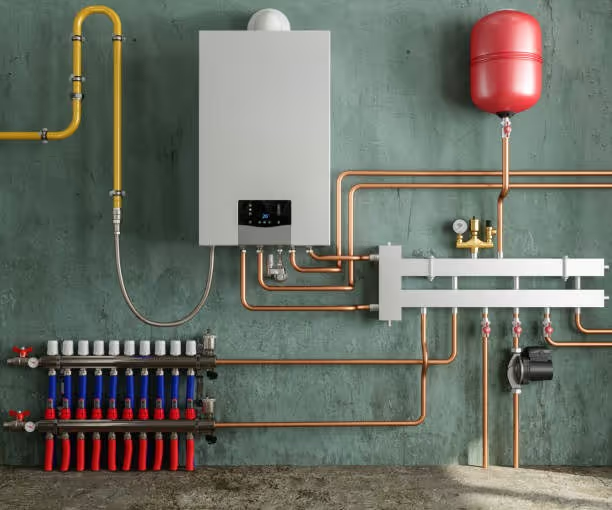Expert Water Heater Repair in Queen Creek
Waking up to a cold shower or discovering a puddle around your water heater is a frustrating start to any day. These issues disrupt your daily routine and can signal a significant problem that requires immediate, professional attention. For homeowners in Queen Creek, reliable access to hot water is not a luxury—it is an essential part of modern life. When your system fails, you need a team of trusted experts who can diagnose the problem accurately and provide a lasting solution, restoring comfort and safety to your home.
Our experienced technicians specialize in comprehensive water heater repair, combining in-depth knowledge with a commitment to exceptional service. We understand the urgency of a malfunctioning water heater and are equipped to handle a wide range of issues, from minor adjustments to complex component replacements, ensuring your system operates safely and efficiently.

Identifying the Problem: Common Water Heater Issues We Solve
A water heater will almost always show signs of distress before it fails completely. Recognizing these symptoms early can help prevent more extensive damage and costly emergency repairs. Our technicians are skilled in identifying and resolving all common water heater problems.
No Hot Water or Insufficiently Hot WaterThis is the most obvious sign of a problem. If you have an electric model, a faulty heating element or a tripped thermostat is often the culprit. For gas water heaters, the issue could stem from an extinguished pilot light, a faulty thermocouple, or a malfunctioning gas control valve. Our diagnostic process pinpoints the exact component failure to restore your hot water supply quickly.
Leaking Water Heater Tank or ConnectionsWater pooling around your unit should never be ignored. Leaks can originate from several places. A drip from the temperature and pressure (T&P) relief valve could indicate excessive pressure or temperature inside the tank. Leaks from inlet or outlet connections may simply need tightening, but corrosion could signal a more serious issue. A leak from the base of the tank itself is a critical sign of internal corrosion and often means the unit must be replaced.
Strange Noises: Popping, Rumbling, or HissingLoud or unusual noises from your water heater tank are typically caused by sediment buildup. Arizona's notoriously hard water contains high levels of minerals like calcium and magnesium, which settle at the bottom of the tank. As the water heats, trapped water beneath the sediment layer boils, creating popping or rumbling sounds. This buildup forces the system to work harder, reducing efficiency, increasing energy bills, and accelerating tank deterioration.
Discolored or Smelly WaterIf rusty, brown water is coming from your hot water taps, it likely indicates that the inside of your tank is corroding. This is often a sign that the sacrificial anode rod has been completely consumed and is no longer protecting the tank. A "rotten egg" smell is caused by a chemical reaction involving bacteria within the tank, which can also be addressed by replacing the anode rod and flushing the system.
Fluctuating Water TemperaturesWater that gets scalding hot or cycles between hot and cold points to a defective thermostat. The thermostat is responsible for regulating the temperature inside the tank. When it fails, it can no longer accurately read or control the heating process, leading to inconsistent and potentially unsafe water temperatures.
Our Comprehensive Repair Services for All Water Heater Types
We provide expert repair services for all major types of water heaters, including conventional gas and electric tank models as well as modern tankless units. Our technicians arrive with the tools and high-quality parts needed to perform precise repairs.
- Heating Element and Thermostat Replacement: We safely test and replace faulty upper and lower heating elements and thermostats on electric water heaters to restore proper function.
- Gas Control Valve, Thermocouple, and Pilot Light Repair: Our certified technicians can expertly diagnose and repair gas system components, ensuring safe and reliable operation.
- Temperature and Pressure (T&P) Relief Valve Service: We can test and replace this critical safety component to protect your tank from excessive pressure and temperature.
- Anode Rod Replacement: Replacing a depleted anode rod is a crucial maintenance step that can significantly extend the life of your water heater tank by preventing internal corrosion.
- Leak Detection and Repair: We meticulously locate the source of any leak, whether from plumbing connections, valves, or the tank itself, and perform the necessary repairs.
- Sediment Flushing and Tank Maintenance: We can professionally flush your tank to remove the efficiency-robbing sediment buildup common in the Queen Creek area, improving performance and longevity.
The Critical Decision: Should You Repair or Replace Your Water Heater?
When faced with a malfunctioning unit, many homeowners wonder if a repair is sufficient or if it’s time for a full replacement. Our technicians provide an honest assessment to help you make the most informed and cost-effective decision for your home. We evaluate several key factors.
Age of the Unit: A standard tank-style water heater has an average lifespan of 8 to 12 years. If your unit is approaching or has surpassed this age, investing in a significant repair may not be economical. A newer unit is often a prime candidate for repair.
Cost of the Repair: A good rule of thumb is to compare the repair cost to the price of a new unit. If the repair estimate is close to 50% or more of the cost of a new water heater installation, replacement is typically the smarter long-term financial choice.
Frequency of Breakdowns: If you have had to service the unit multiple times in the past couple of years, it is a strong indicator that other components are nearing the end of their service life. Continual repairs can quickly add up, making a new, reliable unit a more practical investment.
Performance and Efficiency: An older, inefficient water heater can be responsible for a significant portion of your monthly energy bill. Upgrading to a new, high-efficiency model can provide substantial savings over time, helping to offset the initial installation cost.
Visible Corrosion or a Leaking Tank: Significant rust on the exterior of the tank or, more critically, a leak originating from the tank body itself, is a definitive sign that the unit has failed internally. In this scenario, replacement is the only safe and viable option.






